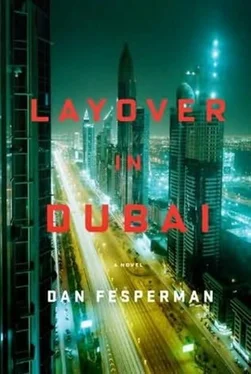The latter possibility reminded him uncomfortably of the woman in blue sequins, but he quickly dismissed the idea that he might meet a similar fate, if only because it was probably what Assad wanted him to think. Sowing fear and doubt were among the best possible ways to lubricate an interrogation. Establishing trust was even more effective, of course, but Assad must have known that was out of the question.
Assad, dressed impeccably as always, waited more than a minute before speaking. Sharaf figured it was supposed to make him lose his cool. Instead he used the time to marshal his defenses.
“We know you’re hiding him,” Assad finally began. It was the first of many small tricks he would attempt. A quick denial would have been an admission of guilt.
“Hiding who?”
Sharaf wrinkled his brow in what he hoped was convincing bewilderment.
“Oh, come on. The American. You were the last officer seen with him.”
“Ah, so that is why I’m here. You still haven’t found him, and you need a scapegoat to explain his escape. There must be pressure from upstairs. Have they threatened a suspension? I don’t envy you, Assad. Who is it you’re trying to impress? Someone in the cabinet?”
“We searched your house. The guest bedroom had been slept in.”
Meaning they hadn’t found Keller. A pleasant surprise. He wondered how the young man had gotten away. Assad’s choice of words also told him they hadn’t found Keller’s clothes, passport, and wallet out in the washtub in the shed. He supposed he might have overlooked those items as well, because who in their right mind would have placed such things in a tub of water, leaving them to soak? Dumb luck on his part, although he certainly had his reasons.
“My son Salim has been sleeping in the guest room. Would you like me to enumerate his embarrassing marital difficulties for you, or must you trouble the rest of my family with prying questions as well?”
Even if Assad checked the story with Salim, a contradiction wouldn’t necessarily be damning. There wasn’t an Emirati male alive who would admit to being kicked out of the marital bed-or, in Salim’s case, both of them.
“Seriously, go and check. You’ll even find some of Salim’s clothes hanging in the guest room closet. Unless he has already moved back home, of course.”
The search must have found the clothes-the very ones Sharaf had taken from Salim’s house for Keller to borrow-with their non-American look and their local store labels, because now Assad didn’t seem so sure of himself. It convinced Sharaf that the lieutenant had nothing more on that front.
“Our search also determined that the American had recently been in your daughter’s bedroom. Ah, I see from your face that this is a surprise to you, and no doubt an unpleasant one.”
Sharaf inwardly cursed himself for betraying his emotions. Had he raised an eyebrow? Drawn a sudden breath? Damn that Laleh. What had she been doing after hours? And God only knows what she would be doing in his absence, especially if Ali had recruited her help in keeping Keller out of harm’s way. Or was Assad bluffing, by probing his best-known weak spot? Sharaf bit his tongue and stared back, trying to look as impassive as possible.
“Yes, he was in her bedroom,” Assad continued. “Her computer had been used not long before we arrived. The screen saver had not even had time to come back on. Keller was familiar with your daughter, wasn’t he? What is her name? Laleh, that’s it. I’ve heard things about her. Her social carelessness, for lack of a better term.”
Sharaf hoped the color wasn’t rising in his cheeks. He wasn’t sure who was upsetting him more-Assad, with this line of inquiry, or Laleh, for providing such a handy tool to lever his emotions.
“I’ll wager you weren’t very pleased by their behavior together. And under your own roof, no less. So save yourself a future ulcer, Sharaf, not to mention lots of embarrassing stories that would be needlessly spread around the city. Just tell me where you’ve stashed this hopelessly uncouth American. Leave him to my team, and this whole affair will be closed cleanly and quickly, with minimal embarrassment and upset to all those parties whom we least want to embarrass and upset. Even his own people wish for this outcome. His embassy is quite up in arms about his disappearance. Or were you not aware of that?”
Another little trap, which he quickly sidestepped.
“Can’t a young lady’s older brother visit his sister’s room without some sort of rumor being attached? Especially an older brother who is currently not welcome in his own home? I’m sure Laleh wouldn’t begrudge Salim a few minutes’ use of her desktop computer, even if he didn’t bother to ask her permission.”
“Very well, Sharaf. Stick with that story for as long as you like.”
Assad surprised him by not pressing the point. Nor did he follow up with brutality or deprivation. He didn’t even shout. When Sharaf asked to use the bathroom, Assad let him, albeit with a police escort. And when Sharaf returned to the room a bottle of cool water and a clean glass were waiting on the floor by his chair. After a half hour more of desultory questioning, Assad ordered him back into the van, this time not bothering with the blindfold. When the panel doors opened an hour later, Sharaf had found himself here, out in the desert at the Dubai Central Jail in Al Aweer. The message seemed clear enough: This was where Sharaf would remain until he decided to talk.
Everything about his arrival at the prison had been unorthodox. Most inmates came on big buses, and were unloaded in an underground garage at the entrance to a holding cell in the intake area. The new arrivals then stood in various lines where their paperwork was processed while guards constantly shouted at them. Each of them got a strip search and a color-coded uniform.
Sharaf was processed upstairs with no waiting and no paperwork, but he did get a strip search. Some goon probed his buttocks with the cool smooth end of a varnished black baton. A guard then handed him the strange white uniform and a pair of slippers before marching him to his cell. On this day, at least, the guards seemed to be dividing the newcomers by nationality. The Indians and Pakistanis went one way, the Westerners another. All the fellow newbies in Sharaf’s cell seemed to be Emiratis.
Sharaf had been freezing cold since his arrival, thanks to the prison’s relentless air-conditioning. He had no underwear and no socks, and on his bunk there was only a top sheet and a thin wool blanket. The way they cranked cold air into the place you’d have thought it was a dairy. Cold or not, it was time to rise. He threw off the flimsy blanket, shivering as he swung his slippered feet onto the chilly floor.
The prison was practically new. As with much of Dubai’s recent construction, no expense had been spared. The rulers had insisted on the best penitentiary money could buy, and at first glance they seemed to have gotten their wish. The bright lights, the stainless steel, the acres of whitewashed concrete, and the glassed-in security hub, with long cellblocks extending from it like the legs of an octopus, made the Central Jail seem like the very model of spotless efficiency.
Look closer, however, and the underlying shoddiness of quick-buck construction was already in evidence. Cracked linoleum. Crumbling concrete. Balky electrical locks that refused to open on demand. Often the intercom failed. When it did, a fellow patrolled the wings with a bullhorn to announce the next mealtime or prayer. The place seemed clean enough, but there was that cockroach Sharaf had spotted, plus a steady stream of ants. And any way you looked at it, it was still a prison, with the usual pecking order of such places-the bullying and the savvy at the top, the timid and the weak at the bottom. Fortunately none of Sharaf’s cellmates seemed to know he was a cop. And on his one visit to the dining hall he had kept his head down, lest any old adversaries spot him.
Читать дальше












